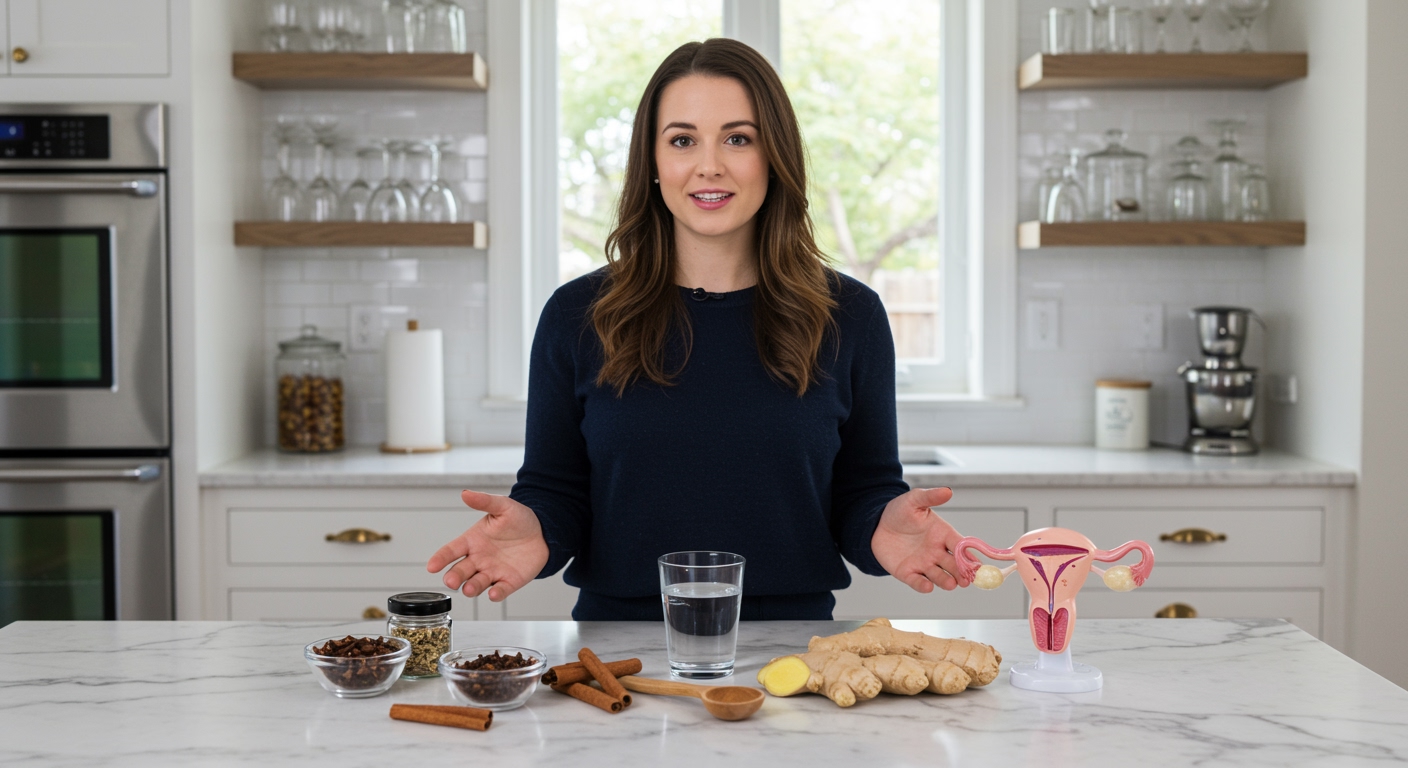✪ Key Takeaway: Cloves may help PCOS by reducing inflammation and improving insulin sensitivity, but they work best as part of a complete treatment plan.
Introduction
You reach for cloves when baking holiday cookies, but this tiny spice might do more than flavor your food.
Women with PCOS often search for natural ways to manage their symptoms because traditional treatments sometimes fall short or cause unwanted side effects.
Hi, I am Abdur, your nutrition coach and today I am going to explain how cloves might support your PCOS management journey.
What Makes Cloves Special For PCOS?
Cloves contain eugenol, a powerful compound that gives this spice its distinctive aroma and potential health benefits.
Research shows eugenol has anti-inflammatory properties that may help reduce chronic inflammation common in PCOS.
This inflammation contributes to insulin resistance, which affects up to 70% of women with PCOS.
Cloves also contain antioxidants that protect your cells from oxidative stress, another factor that worsens PCOS symptoms.
The spice provides manganese, a mineral that supports proper glucose metabolism and hormone production.
Studies suggest that compounds in cloves may help regulate blood sugar levels by improving how your cells respond to insulin.
✪ Fact: One teaspoon of ground cloves provides 30% of your daily manganese needs, supporting enzyme function and metabolism.
How Do Cloves Affect Insulin Resistance?
Insulin resistance happens when your cells stop responding properly to insulin, causing your pancreas to produce more of this hormone.
High insulin levels trigger your ovaries to produce excess androgens like testosterone, leading to PCOS symptoms.
Animal studies show that clove extracts can improve glucose tolerance and reduce blood sugar spikes after meals.
The eugenol in cloves appears to enhance insulin sensitivity by activating specific pathways in muscle and liver cells.
This means your cells can use glucose more efficiently, reducing the demand on your pancreas to produce excess insulin.
Lower insulin levels may help balance hormones and reduce symptoms like irregular periods and excess hair growth.
However, most research comes from laboratory and animal studies, so we need more human trials to confirm these effects.
✪ Pro Tip: Add cloves to cinnamon tea for a synergistic effect on blood sugar control and insulin sensitivity.
Can Cloves Reduce PCOS Inflammation?
Chronic low-grade inflammation drives many PCOS symptoms and complications.
This inflammation interferes with insulin signaling, worsens hormonal imbalances, and increases your risk of heart disease.
Cloves contain multiple anti-inflammatory compounds including eugenol, beta-caryophyllene, and flavonoids.
These compounds work by blocking inflammatory pathways and reducing the production of inflammatory molecules called cytokines.
Studies show that eugenol can suppress nuclear factor-kappa B, a protein complex that controls inflammation in your body.
By reducing inflammation, cloves may help improve insulin sensitivity and support better hormonal balance.
The antioxidant properties of cloves also protect against oxidative stress, which often accompanies chronic inflammation in PCOS.
✪ Note: Cloves rank among the highest antioxidant spices, with more antioxidant capacity than many fruits and vegetables.
What Is The Best Way To Use Cloves For PCOS?
Start with small amounts because cloves have a strong flavor and potent compounds that can be overwhelming.
Add a pinch of ground cloves to your morning coffee, tea, or smoothie for daily intake.
You can steep 2-3 whole cloves in hot water for 10 minutes to make a therapeutic tea.
Combine cloves with cinnamon, ginger, and turmeric for a powerful anti-inflammatory spice blend.
Use cloves in cooking by adding them to stews, curries, or baked goods for both flavor and health benefits.
Limit your intake to 1-2 grams of ground cloves per day to avoid potential side effects like stomach upset.
Always consult your healthcare provider before using cloves therapeutically, especially if you take blood-thinning medications.
✪ Pro Tip: Buy whole cloves and grind them fresh for maximum potency and flavor retention.
Are There Any Risks Or Side Effects?
Cloves are generally safe when used as a culinary spice in normal amounts.
However, large doses can cause stomach irritation, nausea, or diarrhea in sensitive individuals.
Eugenol has blood-thinning properties, so cloves may interact with anticoagulant medications like warfarin.
People with bleeding disorders should avoid therapeutic doses of cloves without medical supervision.
Clove oil is much more concentrated than ground cloves and can cause burns or allergic reactions if used improperly.
Pregnant women should stick to culinary amounts and avoid medicinal doses of cloves due to limited safety data.
Stop using cloves and consult a doctor if you experience any unusual symptoms or allergic reactions.
✪ Note: Always inform your healthcare team about any herbs or spices you use therapeutically to avoid drug interactions.
The Bottom Line
Cloves show promise for supporting PCOS management through their anti-inflammatory and insulin-sensitizing properties.
Small spices can make big differences when used consistently as part of a comprehensive health strategy.
Share your thoughts about using cloves for PCOS in the comments below, and let me know what natural approaches have worked best for you.
References
At NutritionCrown, we use quality and credible sources to ensure our content is accurate and trustworthy. Below are the sources referenced in writing this article:
- PubMed: Cloves and metabolic effects
- PMC: Anti-inflammatory properties of cloves
- Frontiers in Endocrinology: PCOS and natural treatments
- Frontiers in Pharmacology: Eugenol and insulin sensitivity





